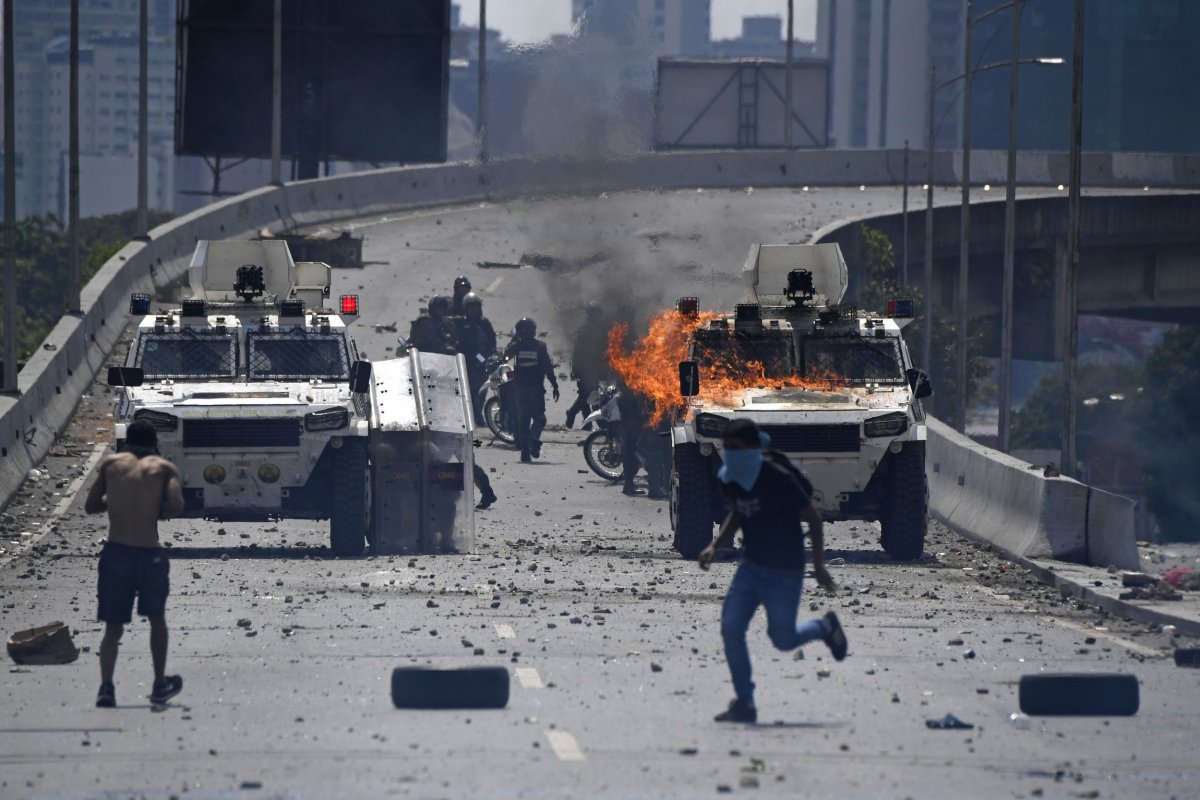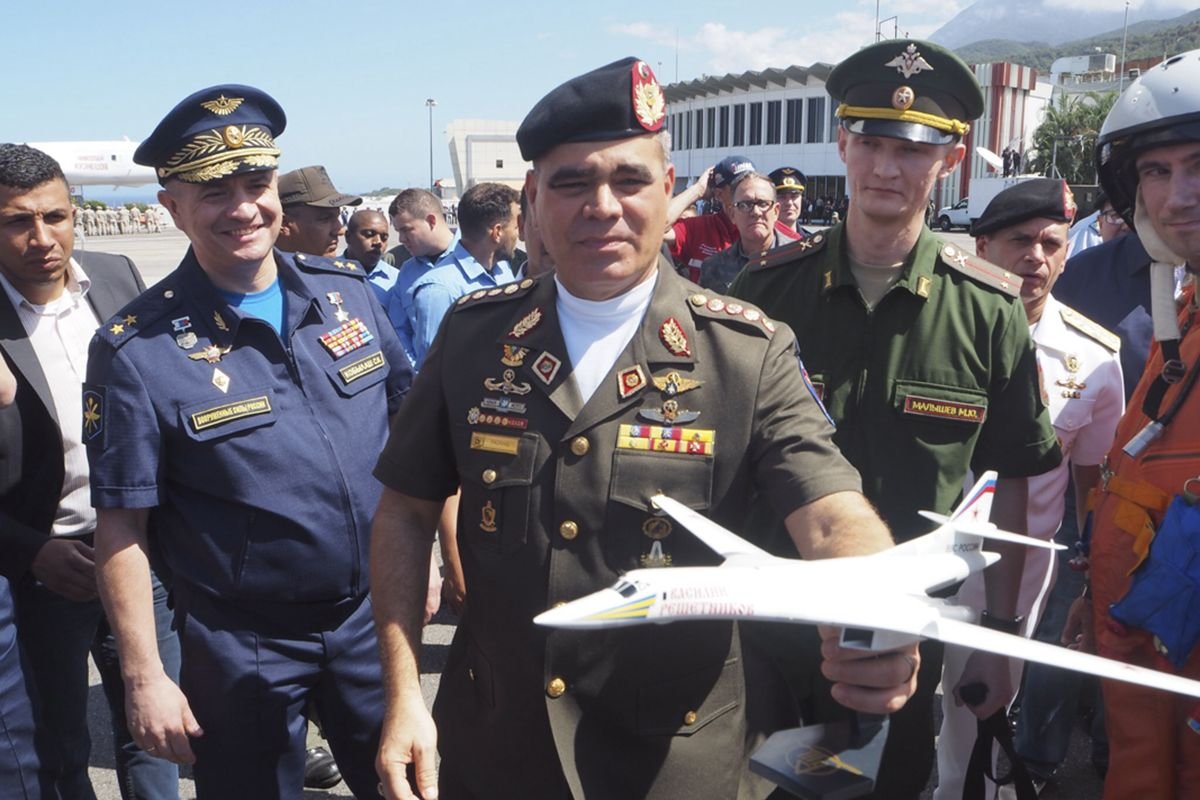Russia has hit back at repeated warnings from the United States over Moscow's alleged role in Venezuela, where Washington has endorsed an attempt to oust the country's socialist government.
As the three-month standoff between Venezuelan President Nicolás Maduro and opposition-controlled National Assembly speaker Juan Guaidó grew violent Tuesday, Secretary of State Mike Pompeo alleged that the Venezuelan leader "had an airplane on the tarmac, he was ready to leave" to Cuba, but "the Russians indicated he should stay." Russia dismissed this narrative Wednesday, with the two country's top diplomats reportedly having it out during a telephone call.
"The focus was on the situation in Venezuela, where yesterday the opposition, with the clear support of the United States, attempted to seize power. It was stressed on the Russian side that Washington's interference in the internal affairs of a sovereign state and the threat against its leadership is a gross violation of international law," the Russian Foreign Ministry said in a readout of the talk between Pompeo and Russian Foreign Minister Sergei Lavrov.
"It was indicated that the continuation of aggressive steps would be fraught with the most serious consequences," the statement added. "Only the Venezuelan people have the right to determine their destiny, which calls for dialogue among all political forces in the country, something its government has long called for. A destructive external influence, especially a forceful one, has nothing to do with the democratic process."

The State Department later released its own readout of the call, during which Pompeo "stressed that the intervention by Russia and Cuba is destabilizing for Venezuela and for the U.S.-Russia bilateral relationship," according to spokesperson Morgan Ortagus.
"The Secretary noted the Russian Foreign Ministry's April 30 statement calling for the renunciation of violence and support for Venezuela's return to stability and prosperity," the statement read. "The Secretary urged Russia to cease support for Nicolas Maduro and join other nations, including the overwhelming majority of countries in the Western Hemisphere, who seek a better future for the Venezuelan people."
Tensions have been mounting in Venezuela since January, when Guaidó declared himself president in a challenge to Maduro, whom the opposition has blamed for a deteriorating economic situation and rampant corruption. Guaidó was immediately recognized by the U.S. and its international allies, including much of Latin America, with the exception of leftist-led nations such as Bolivia, Cuba, El Salvador, Mexico, Nicaragua and Uruguay.
Russia, which has built up "military-technical" ties with Venezuela, opposed the move and was joined by China and Iran in providing support to Maduro's embattled administration as the U.S. ramped up sanctions that have expedited the Latin American country's economic decline. Moscow has continued to send military personnel to Caracas, but indicated they would not intervene, as Guaidó's call for an armed uprising erupted into clashes outside the La Carlota air base.
As the opposition's momentum began to subside, White House national security adviser John Bolton claimed Tuesday that three of Maduro's top officials—Defense Minister Vladimir Padrino, Supreme Court Chief Justice Maikel Moreno and Presidential Guard Commander Hernandez Dala—had agreed to defect. These men publicly remained loyal to Maduro, however, and Moscow dismissed Pompeo's claim that it was involved in the alleged about-face.
"Washington tried its best to demoralize the Venezuelan army and now used fakes as a part of information war," Russian Foreign Ministry spokesperson Maria Zakharova told CNN on Wednesday.

Though Maduro has accused the U.S. of sponsoring previous attempts against his rule, the latest turmoil in Venezuela appeared to be the most serious challenge to the ruling United Socialist Party since its founder, Hugo Chávez, survived a 2002 coup, reportedly one of many U.S.-backed attempts to oust leftist political forces across Latin America and beyond. Washington and Caracas' relations have grown increasingly strained ever since and especially so under the administration of President Donald Trump.
In addition to rolling out new sanctions against Maduro, Trump administration officials reportedly held a number of meetings with Venezuelan opposition members ahead of Guaidó announcing his claim to the office in January. The move came a month after Russia sent nuclear-capable bombers to conduct joints drills with Venezuela in the Caribbean.
The region was the scene of a previous standoff between Washington and Moscow in 1962, when the U.S. military confronted Soviet warships deploying medium-range missiles in Cuba, where the CIA had backed an abortive rebellion against the communist government. As Cold War-era frictions again surfaced between the U.S. and Russia in the 21st century, the White House suspended the 1987 Intermediate-range Nuclear Forces Treaty that has banned such weapons, leading both powers to exchange threats of a renewed arms race.
Update (05/1/19 2:30 p.m.): This story was updated with a readout later released by the State Department regarding the call between Secretary of State Mike Pompeo and Russian Foreign Minister Sergey Lavrov
Uncommon Knowledge
Newsweek is committed to challenging conventional wisdom and finding connections in the search for common ground.
Newsweek is committed to challenging conventional wisdom and finding connections in the search for common ground.
About the writer
Based in his hometown of Staten Island, New York City, Tom O'Connor is an award-winning Senior Writer of Foreign Policy ... Read more
To read how Newsweek uses AI as a newsroom tool, Click here.








